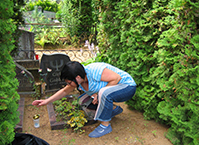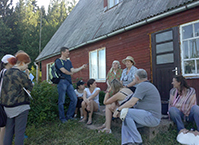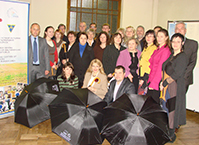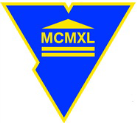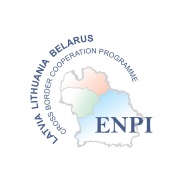Beginning of the war
Categories: Beginning of the war, Jakov Kiselev
It was a deceitful regime. They had been always false to the people. They threw dust in our eyes, pulled the wool over the eyes. This is what is being sung praises, oh! Nobody told the truth in the press that the war could be with the Germans. We even had an agreement with them.
Did you see the film «Yesli zavtra voyna (If war begins tomorrow)», did they screen it to you?
No, I don’t remember. On the contrary, we even were friends with the Germans. They were the best. And nobody saw a word in the press that the Germans were chasing and murdering the Jews. They didn’t inform us at all. But that is why people were worrying, they felt something. But at the same time nobody could believe that such a thing could happen. We had another story. My father was director of the public catering. And when the war began and the Germans were marching across Belarus like at the parade, just before the war, before the beginning of the war he got to know about that from the militarists, military leaders that were heading for Moscow, Leningrad having left the frontier. They knew the real world situation. And Liozno, it is such a strategic city. Meaning? There are 80 km from Liozno to Smolensk, and there are 40 km from Liozno to Vitebsk. You got it? There was a good road then. It was a gravel road. But very good. Made of stone. It was ok. Well. So when the military went to Leningrad, Moscow, and if they had a stop in Liozno, they came to eat at a restaurant or canteen. And they talked to him. That the war is about to begin. The Germans concentrated forces on the border and all that stuff. Therefore, when the war began, the father immediately told us that we should leave.
And how did you learn that the war had begun?
They announced. Too late. Near Liozna. And our soldiers were in Belastok.there are 700 km from Belastok to Liozna and the Germans made this distance in 18 days. About July 10th they had already came up to Liozno, and my Dad with other people, other 7 people made a convoy. Six of them were from Jewish families and one of them was from Borisov, a Belarusian, he was head of the bakery, it's like a bread factory that provided people with bread at that time. And we tackled up the horses with knapsacks and drove off. We went towards Russia. My father and three other men stayed in Liozno, they were not let to go away, they had to feed the leaving military units.
Were there lots of leaving military units?
Yes, there were. Of course they were. People were running away. I can say both the military and acting military units were leaving. They had to feed them. There were some supplies. It’s all the same they were getting lost. So my father draw me a route where to go.
How old were you?
17. And we went. We came up to Kolyshki, 20 km. And made a stop. The women did want to go without their men. Well, my father got to know about that and send a courier to tell us to move away immediately. Then they obeyed and went. So we went. A tour was not very pleasant because we were passing by villages and towns. We could hear people crying and screaming. The Germans were dropping propaganda leaflets over there. Thousands of them were on the ground.
And what was written in them?
Kill the Jews and Communists, political officers. Well there was a little wider text. But the point was this. So that is why they yelled, screamed. However, there was no violence. Only: «Ohh! You are bandits, blood suckers!» Well. And then we passed that, approached Smolensk Oblast, passed Ponizovo, Demidovo, and were approaching Yartsevo. But we were not allowed to pass along because the mechanized troops were going to the front. They said we have to wait until they passed and then we could go. We drove off a kilometer, took out the horses, stopped to have a rest. And at this time the Germans landed their troops. Right to the field where we were. We were in a ravine. That was a famous landing party, it served its big purpose there then.
So you saw a German soldier for the first time then?
Only the paratroopers, they shot. So my father took all the family. These were him, aunt Sonya, elder sister, younger sister and Zhenya from Leningrad. She was on her vacation at ours’ in Liozno. Well. So he took them and ran to the forest. And he called out to me, he threw off a couple of knapsacks, there were four of them, he left two of them, and told me to career the horse behind them. So I careered the horse. I drove out from the ravine. But when I drove out to the road one shaft went out. Well, I tackled it up in a hurry. And the horse was coming to the Germans. My father saw that and cried: «Drop everything and run!» Well, I dropped everything. And we ran to the forest. There were 7 families among us, three of them ran away to the forest, the Borisovy, one Jewish family and ours. And four families came back to Liozno, and then in February they were all murdered, all were shot up. You see. A line, a border between the alive and the dead was so illusory.
Did you stay in the forest? What happened further?
We were going in the forest. Through the forest. My father knew the way out. He knew the way to the villages. Forest is a different story. So we were going and met a forester. We met a man, an old man. He turned out to be a forester. My fatel is telling him, and the man asked: «What is going on there?» We told him: «Don’t go over there, there are the Germans landing». There was shooting and ramble.My father said to him: «Tell me please how to go round the forest. By road. And I tell you where you may go, find and take our goods that belong to seven families; it would be enough for you». And he said:«Ok». It was getting dark already. He said: «Stay at night at my house. Continue your way in the morning». On the way he told my father how to go. We came into his court, it was an isolated farmstead. When we came into the court, there appeared a man, his son-in-law. A young man. He came out and saw us: «Ah! Jews! Aha!» And so on and so forth. This forester I saw felt guilty. He told he didn’t want this situation. Then he told us: «If he does not allow you to come into the house. Then you will stay the night at the bath-house». But what is «staying the night»! At that night me and my father changed turns for sleeping, we were afraid, and at dawn, at the very dawn we were gone. We got out of there. We walked, and then met in the forest 18 or 16 children, in my opinion, with guides from Yartsevo. They were told that there were Germans already and that they shouldn't go there, so they went with us. Finally we came out to the place where our people were. I don't remember, probably it was station Safonovo, but I don't know exactly. I think it's somewhere close to station Safonovo. We came out, handed over the children to the military commandant and our goods train was going to Russia. We took the train. We stood, there was nothing inside. And here we go.
What did you eat?
What did we eat? We ate what we were given. We had nothing. The only thing I had – I don’t remember why I had it on me – was a raincoat. The only thing. I don’t know. I also was given something at the station. I dont remember. And that way we came to Orenburg Oblast. I don’t remember what region it was. To the communal farm. We were met there. They also were starving, but shared everything with us. We couldn’t feel aggrieved.
Did you share the house with anybody?
Yes, to other people. We had no choice. They brought you somewhere and no way.
Images
Audio
Researcher: Наталья Иващенко, кандидат исторических наук, ГрГУ им. Я. Купалы, Светлана Силова, кандидат исторических наук, доцент, ГрГУ им. Я. Купалы


